Writing Advice From the World’s 5 Best Books About Writing
Captivate your audience, provide them better value, and become an impeccable storyteller.

Captivate your audience, provide them better value, and become an impeccable storyteller.
“You can’t be a good writer without being a devoted reader.” — J.K. Rowling
Isn’t it obvious that the best writing advice comes from books?
In this post, I’ve put together actionable writing tips and advice from the world’s top-rated books about writing.
If you’re struggling to make your writing shine, facing a creative block, or just need some motivation to build a daily writing habit, read on for some incredible pieces of advice from some of the world’s best writers. These tips will hone your craft and make your words stand out.
(Note: The links mentioned in this article are affiliate links. If you choose to purchase these books through these links, it will help me earn a small amount of money — at no extra cost to you. Thanks!)
1. Find Beauty in Simplicity
The best pieces of writing aren’t those filled with fancy words and imagery. The best pieces of writing are those that touch your heart the deepest. This is what’s conveyed in On Writing: A Memoir of the Craft by Stephen King.
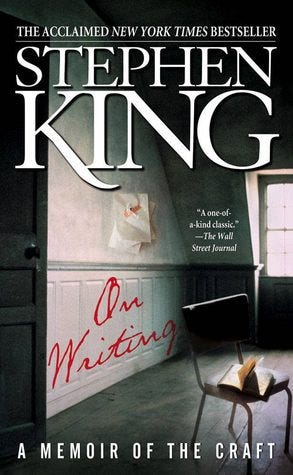
Some of the key takeaways from this book that I recall every day before sitting down to write are:
- Writing frankly and practically. No complicated vocabulary, no adverbs, and no passive voice.
- Never write, “replied,” “remarked,” “muttered,” “yelled,” etc when you can write, “said.”
- Don’t be afraid to kill off your favorite character.
- Always come lightly to the blank age, not with nervousness, excitement, hopefulness, or even despair.
- Keep your prose crystal clear and without affectation or condescension.
- Learn to take delight in revisiting your writing multiple times, reading it aloud to ensure the rhythm is smooth.
“If you want to be a writer, you must do two things above all others: read a lot and write a lot. There’s no way around these two things that I’m aware of, no shortcut.” — Stephen King
Get yourself a copy of this book here.
2. Keep Honing Your Craft
If you know there’s art involved in writing, but it’s also a craft, then you should definitely read On Writing Well: The Classic Guide to Writing Nonfiction by William Zinsser. The author proposes that writing is a skill that can be learned, honed, and developed.
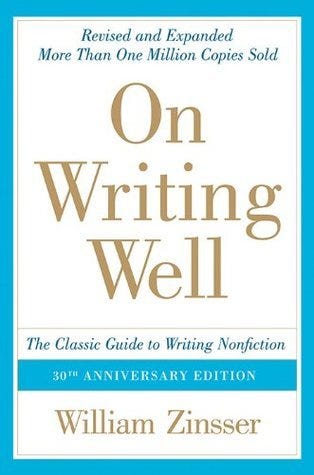
Some key takeaways from the book that I carry with me even today are:
- Eliminate clutter and simplify your work. To get a clear understanding, print out your work, and circle all the words that wouldn’t alter the sentence’s meaning if they were deleted. Then, delete those words to make your writing clear, concise, and impactful.
- Always seek lessons from two of writing’s main sources of inspiration: people and places.
- Don’t think of a faceless entity called “the audience” when you write. Think of writing for yourself. This will make your text authentic and more coherent.
- Readers have no incentive to read your work. You only have a few minutes before they decide not to keep reading. Respect their time and make your writing worth it. Keeping the reader’s attention is the hardest thing you’ll have to learn as a reader.
“But finally the purposes that writers serve must be their own. What you write is yours and nobody else’s. Take your talent as far as you can and guard it with your life. Only you know how far that is; no editor knows. Writing well means believing in your writing and believing in yourself, taking risks, daring to be different, pushing yourself to excel. You will write only as you make yourself write.” — William Zinsser
Get yourself a copy of this book here.
3. Focus on the Specifics
Writing error-free and in concise language might sound like the goal, but to really stand out, your writing needs flourish. You can learn some interesting tricks regarding making your writing sound posh from The Elements of Style by William Strunk Jr., E.B. White.
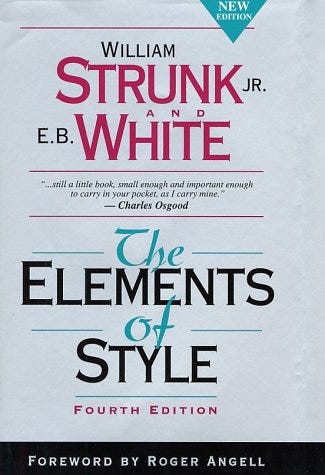
- Form the possessive singular of nouns by adding ‘s. Example- people’s, cat’s, lover’s, etc. There’s no need to use the apostrophe for its, theirs, etc.
- Enclose descriptions of the person between commas. Example: Ram, the pianist, is very tired.
- Place the emphatic words at the end of the sentence.
- Don’t break sentences in two using commas. Use two separate, shorter sentences.
- Assign one paragraph to each topic. Keep the paragraph as a unit of the topic. Start each paragraph with a topic sentence, and end it conforming with the beginning.
- Use definite, specific, and concrete language.
- Always stick to one tense throughout the piece.
“Vigorous writing is concise. A sentence should contain no unnecessary words, a paragraph no unnecessary sentences, for the same reason that a drawing should have no unnecessary lines and a machine no unnecessary parts. This requires not that the writer make all his sentences short, or that he avoid all detail and treat his subjects only in outline, but that every word tell.” — William Strunk Jr., E.B. White
Get yourself a copy of this book here.
4. Stay In Touch With Your Inner Creative
Writing Down the Bones: Freeing the Writer Within by Natalie Goldberg would be super valuable if you want to write what other people want to read and not just what you feel like writing.
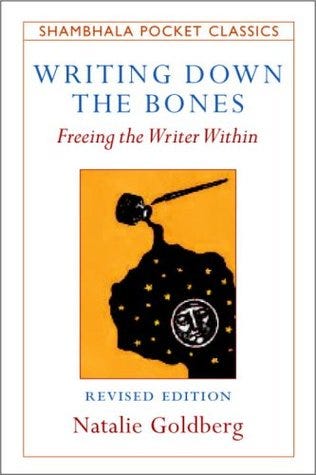
The book focuses on how writers need to stop romanticizing “writing from the heart” and occasionally focus on the less exciting stuff like structure, pacing, and whittling away extraneous words. Some key takeaways from the book:
- If you’re unsure what to write, free write until an idea comes to mind.
- Once you pour your heart into the first draft, you’ve put down the “bones.” Next, you need to learn to *re*write to make it shine.
The author provides several examples and writing exercises to help you practice your craft. Her inspirational tone and the overall feel-good factor in the book will ignite the fire of creativity in your heart and make you want to write more.
“Write what disturbs you, what you fear, what you have not been willing to speak about. Be willing to be split open.” — Natalie Goldberg
Get yourself a copy of this book here.
5. Live the Writer’s Life
How can I write an article about writing advice without mentioning my favorite book on creativity, The Artist’s Way: A Spiritual Path to Higher Creativity by Julia Cameron?
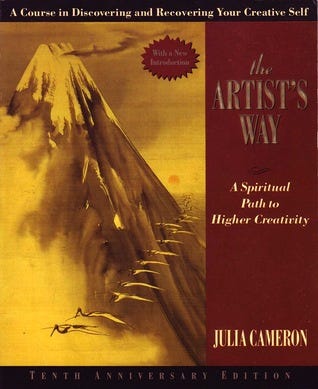
This is not a book to read. It is a book to do. Filled with exercises and thought experiments, it promises major life changes in thirteen weeks. The two key exercises are:
- Maintain daily “morning pages” to get into the habit of writing a journal. The practice of uncritically expressing and recording your thoughts and ideas on paper will definitely get your creative juices flowing.
- Go “artist’s dates.” Regularly take some alone time to care for your inner child and do something you enjoy.
If nothing else, this book will inculcate in you the habit of showing up every day. Once you have that, you’re already living the writer’s life.
“No matter what your age or your life path, whether making art is your career or your hobby or your dream, it is not too late or too egotistical or too selfish or too silly to work on your creativity.” ― Julia Cameron
Get yourself a copy of this book here.
What’s some of the best writing advice you’ve picked up from a book? Do let me know in the comments.
I did my best to make this article as value-packed as possible. If you enjoyed it, join my email family so that I can send more of my work (including tips in creativity, productivity, and self-love) straight to your inbox weekly.


